Many EV drivers use an electric car charger extension lead to charge their vehicles, especially if they don’t have a dedicated home charging point or live far from free public charging stations. However, it’s important to use a heavy-duty extension lead specifically designed for charging electric cars to ensure safety and efficiency. Standard home extension leads are not suitable for this purpose. In this guide, you’ll learn about the safety considerations of using an EV charger extension cable, how it affects car charging times, and how to choose the best one for your vehicle.
Key Takeaways:
- An electric car charger extension lead provides a practical solution for EV charging without a dedicated home charging point or access to public charging stations.
- Using a heavy-duty extension lead specifically designed for electric cars is essential for safety and efficiency.
- Standard home extension leads are not suitable for charging electric cars.
- Safety concerns include overheating and the need for a waterproof and defect-free extension lead.
- An extension cable can affect car charging times depending on its power output, cable diameter, and the charging cable’s specifications.
Is it safe to use an EV charger extension cable?
Using an electric car charger extension lead can be a convenient solution for charging your electric vehicle when you don’t have access to a dedicated home charging point or nearby public charging stations. However, safety should be a top priority when using an EV charger extension cable.
Standard extension cords are not designed to handle the sustained charging periods required for electric cars. This can lead to overheating and other safety concerns. To ensure safe and efficient charging, it is crucial to use a heavy-duty extension lead specifically designed for electric car charging.
Here are some key safety considerations to keep in mind when using an EV charger extension cable:
- Heavy Duty Construction: Choose an extension lead that is built to withstand the electrical load of charging an electric car. It should be rated for at least 13 amps and have a robust construction to prevent overheating and potential fire hazards.
- Waterproof and Weatherproof: Look for an extension lead that is designed for outdoor use and has strong waterproof capabilities. This will protect you and your vehicle from any moisture-related risks, especially in rainy or damp conditions.
- No Defects: Inspect the extension lead carefully to ensure there are no visible defects, such as exposed wires or damaged insulation. Using a lead with defects can increase the risk of electrical shocks and potential short circuits.
It is important to avoid using a standard domestic extension lead for charging your electric car, as it may not meet these crucial safety requirements. Invest in a dedicated heavy-duty EV charger extension cable to ensure safe and reliable charging.
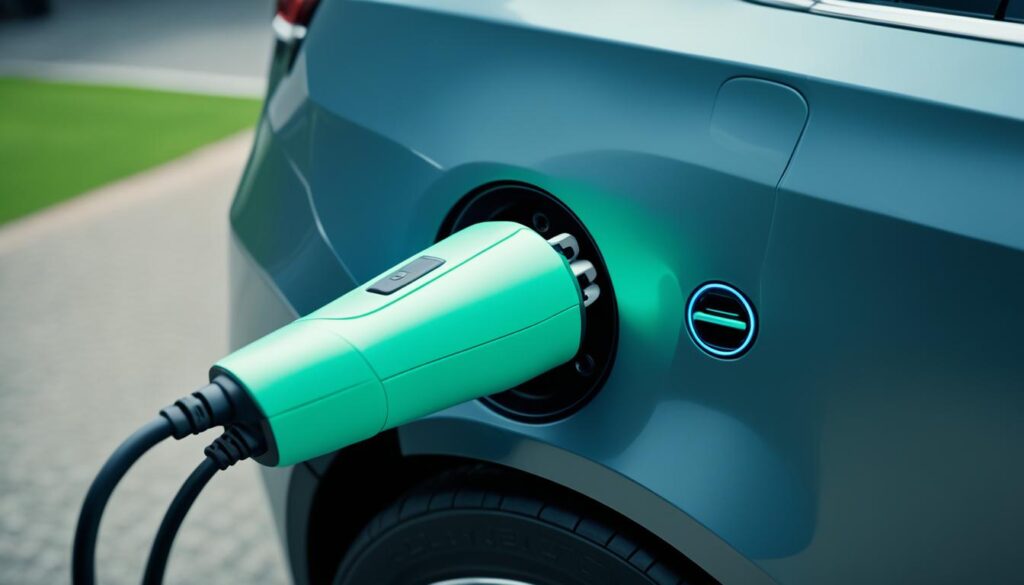
Table: Comparison of safety features in different EV charger extension cables
| Brand | Current Rating (Amps) | Waterproof Rating | Defect-Free Guarantee |
|---|---|---|---|
| Brand A | 15 | IP65 | Yes |
| Brand B | 20 | IP67 | Yes |
| Brand C | 13 | IP66 | Yes |
“Safety should always be the top priority when it comes to using an EV charger extension cable. Don’t compromise on quality and invest in a heavy-duty extension lead designed specifically for electric cars.”
How does an extension cable affect car charging times?
Using an extension cable can have an impact on your car’s charging times. The charging speed is determined by the power/current of both the EV charging cable and the extension lead. If the extension lead has a lower power output than the charging cable, it can limit the charging speed of your electric vehicle. For example, a 16 amp charging cable may charge your car faster than a 10 amp extension lead.
The choice of cable diameter also plays a significant role in charging times. Thicker cables have a larger capacity to handle higher power outputs, which can lead to faster charging. When selecting an extension cable, consider its diameter to ensure it can accommodate the necessary power requirements for efficient charging.
It’s essential to carefully consider these factors when using an extension cable to charge your electric car. Ensuring compatibility between the charging cable and the extension lead can help optimize your charging experience and minimize charging times.
Example:
Using an electric car charger extension lead with a higher current rating than your charging cable can result in faster charging times.
| Charging Cable Current | Extension Lead Current | Charging Times |
|---|---|---|
| 10 amps | 10 amps | Standard charging times |
| 16 amps | 10 amps | Faster charging times |
| 16 amps | 16 amps | Optimal charging times |
How to choose the best EV extension cable
When selecting an EV extension cable, it’s crucial to consider certain features to ensure optimal performance and safety for your electric car charging needs.
Waterproof and Durability
One important factor to consider is the cable’s waterproof rating. Look for an extension cable with an IP rating of at least IP66 or higher. This ensures that it can withstand exposure to water and harsh weather conditions, providing durability and protection against moisture.
Heavy Duty Power Output
For efficient charging, it is essential to choose a heavy-duty extension cable with a power output of at least 13 amps. This higher amperage rating enables faster charging times and ensures compatibility with electric car charging equipment. Additionally, a heavy-duty cable construction guarantees durability and long-lasting performance.
Defect-Free and Safety
Inspect the extension cable thoroughly for any defects before purchase. Look for signs of exposed wires or broken sections, as these can pose safety risks. It’s vital to choose an extension cable that is free from any visible defects, ensuring smooth and safe charging operations.
RCD for Protection Against Electric Shocks
Consider opting for an extension cable that includes a Residual Current Device (RCD). This safety device provides protection against electric shocks by quickly cutting off the power supply in case of a fault or electrical imbalance. The inclusion of an RCD in the extension cable enhances safety during the charging process.
Charging Speed and Public Charging Points
When selecting an EV extension cable, take into account the charging speed provided by the cable. A higher power output cable can significantly reduce the charging time for your electric car. Furthermore, consider the availability and accessibility of public charging points in your area. Choosing an extension cable that complements your charging needs, whether at home or public locations, is essential for a seamless charging experience.
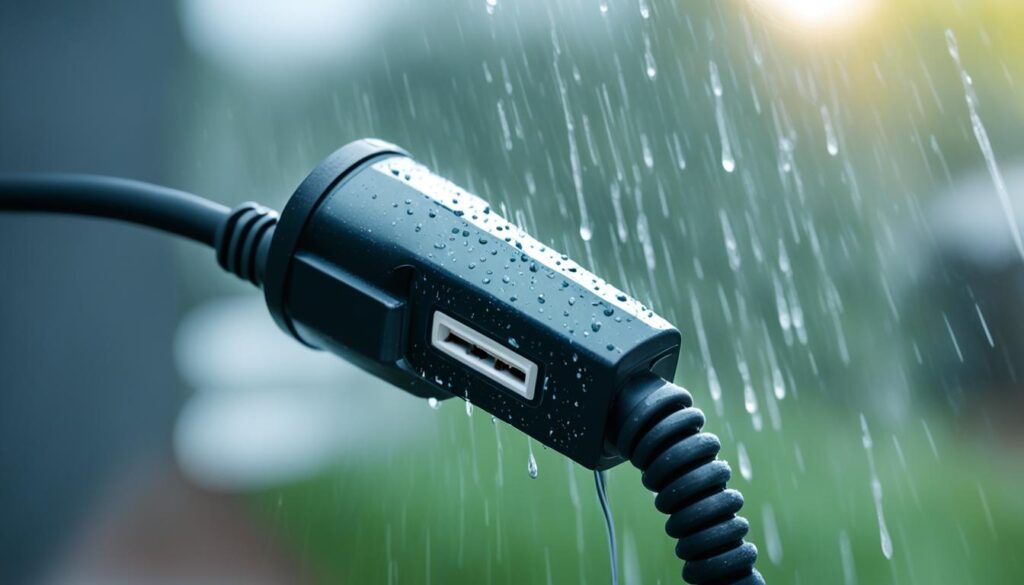
Ensure you choose a reliable and high-quality EV extension cable that meets these criteria to ensure safe and efficient charging for your electric car.
Conclusion
Using an electric car charger extension lead can provide a practical solution for charging your EV in certain situations. However, it is crucial to prioritize safety and select a heavy-duty extension lead specifically designed for electric car charging. When choosing the best EV extension cable, consider factors such as power/current, weatherproofing, and cable diameter to ensure efficient and secure charging.
It is also essential to understand how the extension cable may impact charging times. The power output of the extension lead should match or exceed that of the charging cable to avoid limiting the charging speed. Thicker cables with a higher power output can handle faster charging, so keep this in mind when making your selection.
In addition to using an extension cable, exploring other options like public charging points can provide faster and safer charging experiences. Taking advantage of these convenient locations can help minimize your reliance on extension leads and ensure efficient charging for your electric car.
By following these guidelines and considering safety, charging times, and optimal cable selection, you can make informed decisions to ensure the safe and convenient charging of your electric car wherever you are.





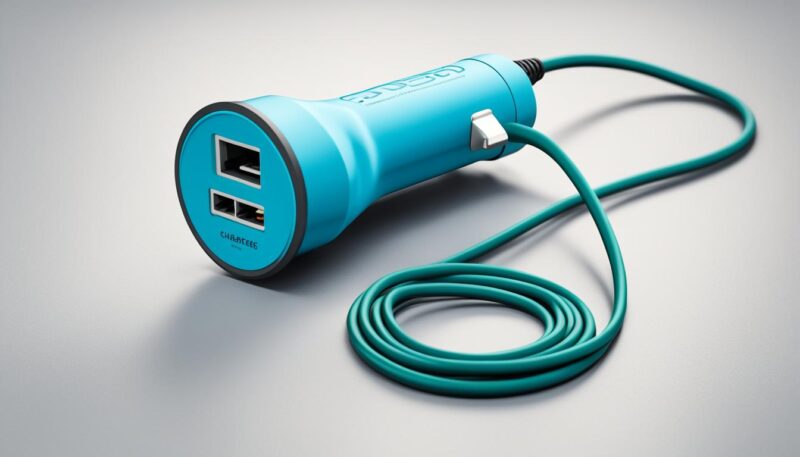
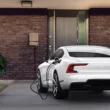
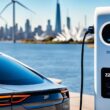
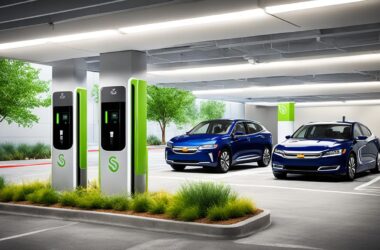
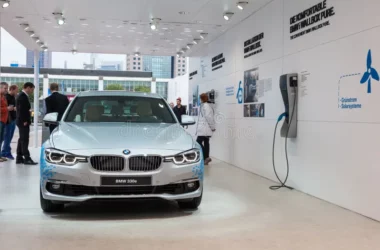
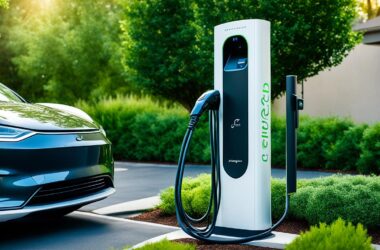
This really answered my downside, thanks!
Hello there, I found your website via Google while searching for a related topic, your website came up, it looks good. I have bookmarked it in my google bookmarks.
Thanks for sharing excellent informations. Your website is so cool. I am impressed by the details that you have on this website. It reveals how nicely you perceive this subject. Bookmarked this web page, will come back for more articles. You, my pal, ROCK! I found simply the info I already searched everywhere and simply couldn’t come across. What an ideal site.